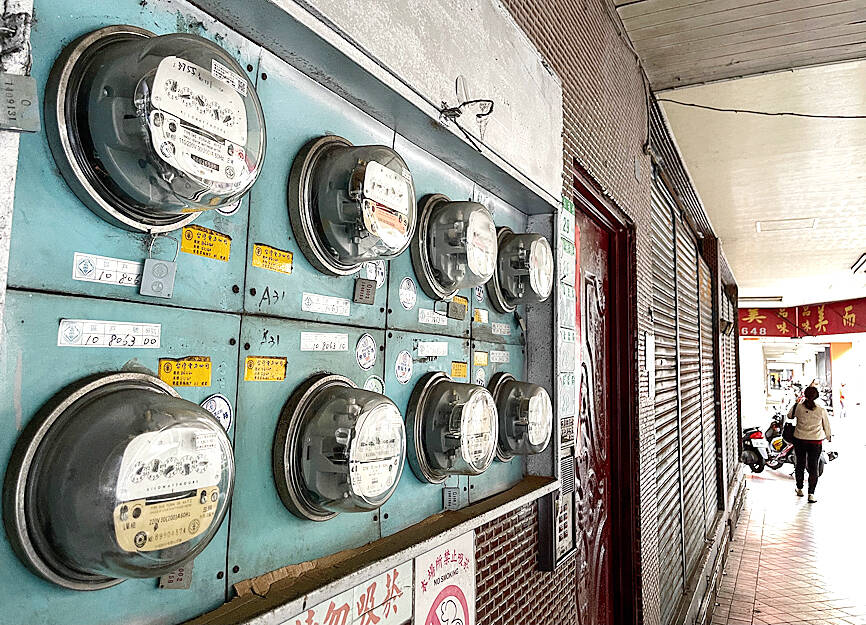The nation’s electricity rates are to remain at an average of NT$3.1154 per kilowatt-hour (kWh) for the next six months due to a drop in international fuel prices and the government’s policy of stabilizing consumer prices, the Ministry of Economic Affairs (MOEA) said in a statement yesterday.
A continued capital injection from the government to state-run Taiwan Power Co (Taipower, 台電) to help support its finances is another reason for the power price freeze, the ministry said.
The decision came after a meeting of the ministry’s electricity price review committee, which determined that electricity rates should be frozen after prices were raised 8.4 percent on average in July last year and 11 percent on average in April.

Photo: CNA
In particular, industrial consumers, namely high-voltage and ultra-high-voltage electricity users, faced rate hikes of 15 percent in July last year and 17 percent in April.
Due to a policy that took effect in July last year, the review committee would continue supporting the domestic agriculture and fishery sectors, schools, social welfare groups and wet market vendors by not increasing their electricity rates for the next six months, the ministry said.
However, the committee ended a freeze on rates for about 880 businesses, including department stores, cinemas, gyms, restaurants and catering service providers, as their power usage and revenues in the first half of the year were higher than the same period last year, the ministry said.
In other words, those businesses would face a 15 percent increase in electricity rates starting next month, it said.
Meanwhile, the committee in April only raised rates half as much (8.5 percent) for low-voltage electricity users, such as the textile, glass, metal, bicycle and optoelectronic sectors, and yesterday maintained those rates for the next six months due to the weak business climate those businesses face, the ministry said.
Overall, the committee’s decision to freeze or cap electricity rates would benefit 120,000 businesses, it said.
Taipower, which reported losses of NT$123 billion (US$3.84 billion at the current exchange rate) in the first half of the year, has said it expects an aggregated loss of about NT$400 billion by the end of this year.
The company received NT$150 billion in capital and an electricity subsidy of NT$50 billion from the government this year, with an additional capital injection of NT$100 billion planned for next year, which would help strengthen its financial health, the ministry said.
The next meeting to determine electricity rates is to take place in April next year.

When an apartment comes up for rent in Germany’s big cities, hundreds of prospective tenants often queue down the street to view it, but the acute shortage of affordable housing is getting scant attention ahead of today’s snap general election. “Housing is one of the main problems for people, but nobody talks about it, nobody takes it seriously,” said Andreas Ibel, president of Build Europe, an association representing housing developers. Migration and the sluggish economy top the list of voters’ concerns, but analysts say housing policy fails to break through as returns on investment take time to register, making the

EARLY TALKS: Measures under consideration include convincing allies to match US curbs, further restricting exports of AI chips or GPUs, and blocking Chinese investments US President Donald Trump’s administration is sketching out tougher versions of US semiconductor curbs and pressuring key allies to escalate their restrictions on China’s chip industry, an early indication the new US president plans to expand efforts that began under former US president Joe Biden to limit Beijing’s technological prowess. Trump officials recently met with their Japanese and Dutch counterparts about restricting Tokyo Electron Ltd and ASML Holding NV engineers from maintaining semiconductor gear in China, people familiar with the matter said. The aim, which was also a priority for Biden, is to see key allies match China curbs the US

NOT TO WORRY: Some people are concerned funds might continue moving out of the country, but the central bank said financial account outflows are not unusual in Taiwan Taiwan’s outbound investments hit a new high last year due to investments made by contract chipmaker Taiwan Semiconductor Manufacturing Co (TSMC, 台積電) and other major manufacturers to boost global expansion, the central bank said on Thursday. The net increase in outbound investments last year reached a record US$21.05 billion, while the net increase in outbound investments by Taiwanese residents reached a record US$31.98 billion, central bank data showed. Chen Fei-wen (陳斐紋), deputy director of the central bank’s Department of Economic Research, said the increase was largely due to TSMC’s efforts to expand production in the US and Japan. Investments by Vanguard International

STRUGGLING TO SURVIVE: The group is proposing a consortium of investors, with Tesla as the largest backer, and possibly a minority investment by Hon Hai Precision Nissan Motor Co shares jumped after the Financial Times reported that a high-level Japanese group has drawn up plans to seek investment from Elon Musk’s Tesla Inc to aid the struggling automaker. The group believes the electric vehicle (EV) maker is interested in acquiring Nissan’s plants in the US, the newspaper reported, citing people it did not identify. The proposal envisions a consortium of investors, with Tesla as the largest backer, but also includes the possibility of a minority investment by Hon Hai Precision Industry Co (鴻海精密) to prevent a full takeover by the Apple supplier, the report said. The group is